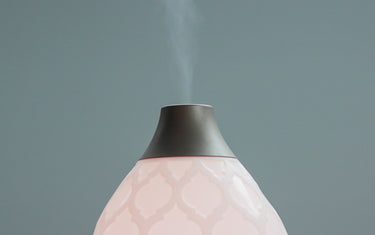7 min read / 23 December 2022 / Laura Garvin Gomez
Diffusers vs Humidifiers: What's the Difference?
These two products might seem the same, but there are many elements that set them apart.

Diffusers and humidifiers seem the same on the outside - so what actually separates them from one another?
It's likely both terms have been floating around interchangeably in the heads of those who have never used them, and understandably so.
Diffusers and humidifiers carry very similar properties that can sometimes lead to confusion as to which should be used for what purpose.
Thankfully, this handy guide is here to give you all the facts on how each of them work, the difference between humidifiers and diffusers, and how to choose the best one for you.

Humidifier vs Diffuser: Is a humidifier a diffuser?To put it plainly - humidifiers and diffusers are not the same thing. This may have been pretty obvious by now. While they both work with water and steam, their purposes vary greatly and can affect your household in entirely different ways. A humidifier is a device designed to add moisture to your home. If you've ever felt as if the air was drying around you, especially in the height of winter, humidifiers would be a good choice for dissipating this dryness. They work by dispersing water from a reservoir into a fine mist, filling the air and leading to - as the name would suggest - more humidity. This raises the moisture levels and prevents that drying feeling from sticking around too long. Diffusers, on the other hand, are primarily used in conjunction with essential oils. Their function is fundamentally the same, but their main purpose is to disperse the oils through the air, and not the water. Of course, it's undeniable that diffusers also contribute to humidity through their release of mist, but this isn't the main reason why someone would go out of their way to buy one. |
What are humidifiers good for?
Dryness in the home can cause more health problems than one might think.
If left unchecked, lack of moisture can lead to dry skin, chapped and peeling lips, sore throats, and can even increase your chances of contracting respiratory diseases like cold or flu.
Adding a humidifier to your home can help prevent these issues, as well as save you a penny or two on your energy bills, as dry air can actually make your home feel colder than it actually is.
Having higher humidity can also positively impact those with skin conditions like eczema or psoriasis, as the atmosphere can help keep these areas well-moisturised as opposed to stripping them of their already delicate sensibilities.
What are diffusers good for?
Diffusers are a great choice for anyone who enjoys the comfort of aromatherapy.
They are the most common way to enjoy essential oils throughout the home, and are fairly easy to use once you wrap your head around their functions.
Essential oils themselves are packed full of natural benefits that can be unlocked through inhalation, and those that choose to use diffusers tend to prioritise these effects above all else.
Lavender Oil is a great example of an essential oil that works well in diffusers. Depending on the oil you choose, some essential oils can do anything from reducing stress and anxiety levels to improving concentration, memory, and mood.
Oils like eucalyptus are also known expectorants, and are therefore handy to diffuse during the colder seasons as a way to minimise and prevent the symptoms of cold and flu.

What types of humidifiers are there?
There are four main types of humidifiers available:
- Evaporative
- Ultrasonic
- Steam
- Impeller
Evaporative humidifiers are the most simple, and work by pulling water up through a wick and evaporating it into the air.
Ultrasonic humidifiers work in a similar way to ultrasonic speakers in that they use high frequency vibrations to break up their components.
In this case, a vibrating diaphragm breaks up the water and turns it into a cool mist, which is then dispersed around the room.
Steam diffusers operate by boiling water to create a warm, gentle mist. This type of humidifier is popular amongst those who are prone to allergies, as it kills the bacteria passing through during the heating process.
Steam diffusers are not the best choice for those with small children, however, as their heat can lead to an increased risk of burns.
Finally, impeller diffusers have a spinning disk to help break up the water into droplets. These droplets are then released through the air in mist form.
Unlike steam humidifiers, impeller humidifiers are a great choice for homes with small children as they don't require any heat to function.
What types of diffusers are there?
Diffusers vary a little more than humidifiers in that they don't actually have to be electric.
Passive options like reed diffusers are very popular among low-fuss households, and there are many other ways to utilise the benefits of essential oils without diffusers being present at all.
Of course, electric diffusers are the most popular option by far, and are the primary culprits in their similarities to humidifiers, so it's worth noting some of the different types available on the market.
The four main electric diffuser options include:
- Nebulising
- Evaporative
- Ultrasonic
- Heat
Nebulising diffusers are considered the most effective for their simplistic method. Essential oils are added to a tube with air blowing across the top of it. This air then proceeds to suck up the oil to the top of the tube and disperse it safely around the room.
Evaporative diffusers also use airflow to disperse essential oils. The user drops their chosen oils onto a filter pad that is placed on top of a fan, and this fan proceeds to evaporate the oil around the room.
Ultrasonic diffusers, like their humidifier counterparts, use vibrations to separate the oil from the water - proceeding to break the oil up into tiny particles once it reaches the surface.
Heated diffusers use warmth to evaporate their oils, and can sometimes function with a specific type of light or candle. The heat warms the oil and allows the particles to break apart into the atmosphere.

How to use a humidifier safely
The main thing to worry about with your humidifier is keeping it clean.
As its function is essentially to pump water particles around your home, failure to frequently wipe it down could lead to the growth and build up of mould, mildew, and bacteria inside your tank.
This can create harmful particles that spread across your home every time you turn your humidifier on - which could end up causing more problems than if you didn't use your humidifier at all.
To prevent these issues, you should aim to clean your humidifier at least once a week. Take out the tank and wash it thoroughly with soap and water, then allow it to dry fully or wipe it down with a dry cloth before replacing.
When using a steam humidifier, you should also be wary of burns, especially in households with small children or animals.
How to use a diffuser safely
When it comes to diffusers, the primary concern falls less on the model itself, and more on the essential oils placed within it.
Great care should always be taken when adding essential oils to your diffuser basin, as undiluted contact with the skin could lead to irritation or rashes that can be painful, uncomfortable, and troublesome if not treated correctly.
Essential oils should also never be ingested, so it's important to keep them away from animals or small children who may be prone to reaching for them.
The actual diffuser model won't cause many issues on its own, however it is important to always switch it off after use, particularly if it uses heat to operate as this could end up being a fire risk.
Diffusers also benefit from frequent cleans for similar reasons to humidifiers. Always refer to your model's instructions for the best ways to do this.
If you're planning on using multiple essential oils in your diffuser, it could be a good idea to wipe it down after every use too, as this avoids cross-contamination between scents.
Combo humidifiers and diffusers
Certain devices claim to be a cross over between a diffuser and a humidifier, allowing you to place essential oils into the same reservoir used for for dispersing air.
While these may be beneficial for certain households, they do require a little more maintenance than each individual type of model.
It's also important to note that diffusers that use water are not humidifiers in themselves, as they do not contain a large enough capacity for volume to be considered as such.

Choosing the right type of product for you and your home will very much depend on your personal needs and requirements.
If you feel your home needs and extra kick of moisture, but don't much care for aromatherapy, then a humidifier is likely to be the best choice.
Similarly, if your primary motive is to experience the impactful benefits of essential oils, a diffuser is probably just the thing you're looking for.
Regardless of which one you choose, each model will carry its own advantageous properties that will leave you reaching for them again and again.









